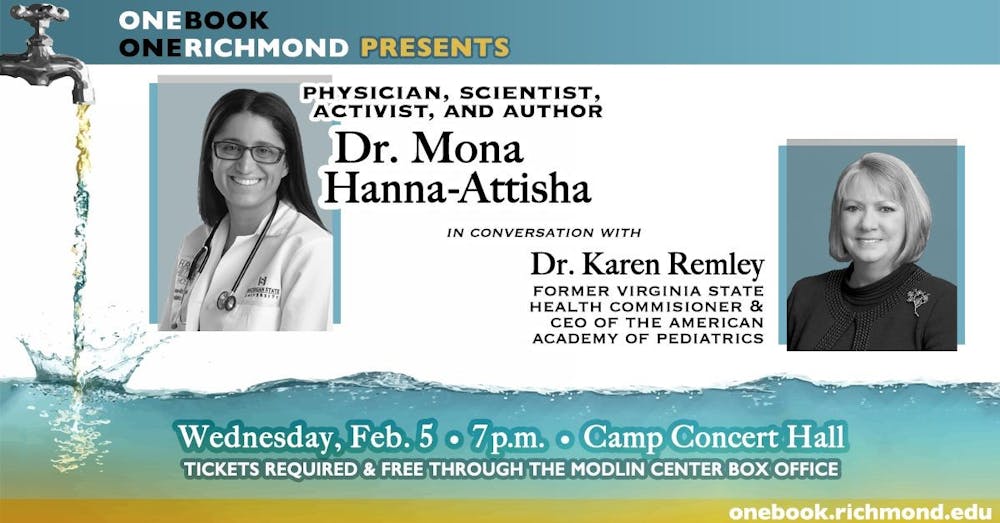“Our water can predict how long of a life a child will live,” said author and pediatrician Dr. Mona Hanna-Attisha at the One Book, One Richmond keynote talk Wednesday at 7 p.m.
The talk was held in Camp Concert Hall. Hanna-Attisha and Dr. Karen Remley, former CEO of the American Academy of Pediatrics, spoke.
Hanna-Attisha’s book, “What the Eyes Don’t See,” recounts her first-hand experience with the Flint, Michigan, water crisis and how she brought it to light.
“People closed their eyes to Flint," Hanna-Attisha said. "They knew there was a problem and turned the other way."
Lead was contaminating the water, and Flint’s county public health department didn’t care, Hanna-Attisha said. Lead cannot be seen in water — its effects cannot be seen but the consequences can be seen years or decades later, she said.
Hanna-Attisha decided to do something.
“I realized I don’t have to have my eyes closed," she said. "Collectively, we could fight for the kids."
As a pediatrician, she knows that it is important to recognize factors that contribute to a child’s health, Hanna-Attisha said. This issue had nothing to do with herself and everything to do with her kids, she said.
To understand the problem, one has to understand Flint’s history, Hanna-Attisha said. Flint wasn’t always in poverty. It was known for having the highest income per capita in the U.S., she said.
Then, Flint began to suffer from greed, lack of investment and racism, so workers went on strike, plants closed and jobs were lost, Hanna-Attisha said. Those who could afford to leave, did, she said. The fresh water that was once supplied by the Great Lakes was now too expensive for Flint, and its new source of water comes from the Flint River, she said.
Remley, who guided the conversation, said there are issues from the past that result in the problems of today.
“All of us are guilty at not looking at history and trying to fix these issues," Remley said.
Enjoy what you're reading?
Signup for our newsletter
There’s a lot that science says we can do, Hanna-Attisha said.
“My reason for being involved is to push scientists to use their science,” she said.
The community can take steps to help as well, said sophomore Kristen Starks and senior Michael Bonifonte.
“I think we should be invested in asking more questions,” Starks said.
Starks said if people were more curious, they would learn more and inspire action.
“We need governing forces to spread information,” Bonifonte said.
Bonifonte said that prior to the talk, he had heard of the Flint water crisis through televised news but did not get a detailed understanding.
The Flint water crisis is an ongoing problem, much like other issues in the world today, Hanna-Attisha said.
People must take care of each other. Fixing the water crises was not her job, but Hanna-Attisha knew she had to do something, she said.
“My book has no end. It is a story that continues,” she said.
Contact news writer Haley Gibbons at haley.gibbons@richmond.edu.
Support independent student media
You can make a tax-deductible donation by clicking the button below, which takes you to our secure PayPal account. The page is set up to receive contributions in whatever amount you designate. We look forward to using the money we raise to further our mission of providing honest and accurate information to students, faculty, staff, alumni and others in the general public.
Donate Now



